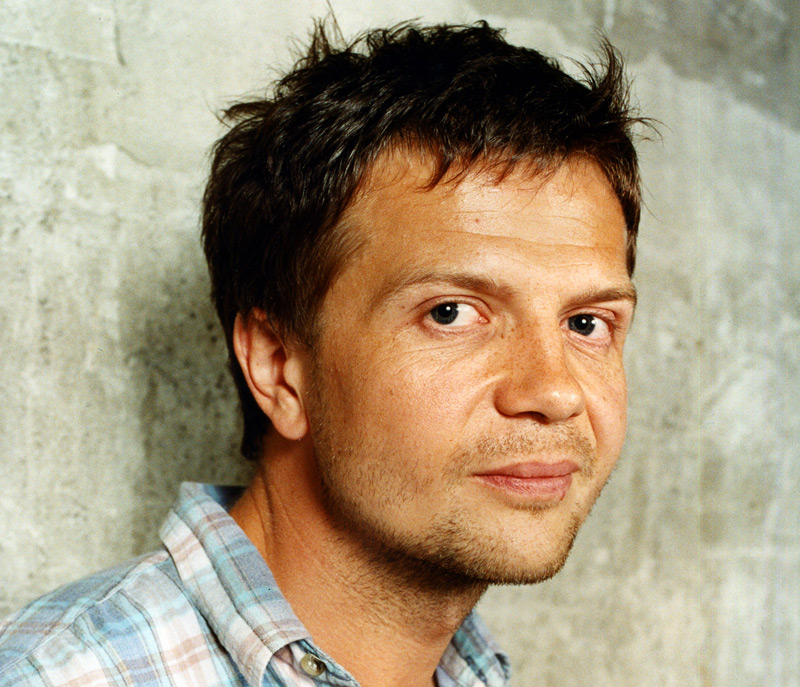about the production
The theme of domestic violence and ill-treatment of a small child is clearly enough shocking material, but it does not differ from other works by Béla Pintér. So far most-known production of The Peasant Opera, appreciated by Hungarian critics as the best of the season and visiting many festivals, is an every-day story inspired by contemporary opera and the tragic of folk ballads dealing with the theme of incest within a marriage of cousins, secret parenthood and murder of a new-born baby. It can be said that in almost all of his projects Pintér and his team examine Hungarian cultural heritage. The heritage, full of folk traditions, which they modify, disturb, correct and disenchant and at he same time they ask questions dealing with identity and nationality in today´s Europe.
Béla Pintér is a distinctive personality of contemporary Hungarian theatre. He started his career as a dancer and actor in the 1980s and 1990s in various experimental productions. This strong, independent artist connects in his productions folk tradition (music, dance, legends, myths, fairytales) with what we call a post-modern theatre. Pintér reflects Hungarian history and socio-political reality of today differently but equally bravely and exactly like, let us say, Arpád Schilling in the Krétakör Theatre. He makes magic in the world of ritual theatre and at the same time he ironizes it through himself alone (The Queen of the Cookies is played in a circle and Pintér as Centaur turns this circle mythically). He is inspired by tradition which he both celebrates and denies (the Hungarian folk music and playing traditional citer is here something nostalgically beautiful but also distastefully ossified, tiresome and anxious). By the way, the music of Pintér´s productions always drives the centre – whether he uses it to sharpen his sarcasm or soften cruel and horror-like situations. In Pintér´s drama, which reminds of a smudgy and ragged picture from some dirty pit in the end of the world and from the past we would like to forget, there is nothing coincidental. Every look of the actors, every word, gesture, sound, melody, visual motif or even the slightest detail of costumes or stage simulate associative play of meanings. The classical narrative form and theatrical illusion collide with the fragments of everydayness, the kitsch and stylization blend with original art and together they create a surreal world pulsing on the edge of a dream and banality.
Romana Maliti
“The characters of The Queen of the Cookies, their relationships, the atmosphere of the story – that is all very well-known to us. In the darkness of the beginning of the productions we hear the Orwellian year of 1984, the symbol of the generations of the characters, in the very first utterance. That is for us to get knew ourselves. Also the early Pintér´s pieces were created out banalities, from in advance prepared elements, cultural and, mainly, subcultural layers. In his works there are gathered extraordinary colourful smithereens. There are two things that unite them and differentiate them at the same time. On the one side there is the way in which he observes and depicts his stories: the refractivity, the view on this homely world through a carnival-like laugh. On the other side there is a stage speech by which the author-director-actor creates the distance between the narrated story and the way of narration between – what and how.”
Tamás Koltai, Élet és Irodalom, 2004
“The Queen of the Cookies is Pintér´s darkest play, or if not the darkest one then surely the most dramatic one, and gives the least opportunities to laugh. Although he does not completely desert it – the spectator expects it (audibly). I suspect his audience that it already counts with the fact that it can, or it should, laugh. Well, and it laughs, even though in this case it has much less opportunities to it than ever before. There is a plenty of humour in the dialogues but the world outside is dark. We – same like the author – do not take this world as humorous as the world in the productions of The Peasant Opera or Gyévuska. We cannot freely laugh over the direct cruelty of The Queen of the Cookies. It is truth that none of Pintér´s previous laughs were cloudless, there was always something freezing in them. Now, however, there he stands, cap-a-pie dramatic Pintér. Again, we find ourselves in reality, like we did before the ´musical´ era of his work.”
Andrea Tompa, Színház, 2004
creators
directed by Béla Pintér and company
composer: Benedek Darvas
costumes: Mari Benedek
stage designe: Péter Horgas
light: Gábor Tamás
sound: János Rembeczki
assistants of the director: Andrea Pass, Szilvia Matók
characters and cast:
Erika, seven-year girl Éva Enyedi, Pista, Erika´s father Béla Pintér, Uncle Lajos, class master Tamás Deák, Olga, Erika´s mather Tünde Szalontay, Anikó, Uncle Miska´s wife Éva Csatári, Tibi, Erika´s cousin Szabolcs Thuróczy, Zolika, Erika´s cousin József Tóth, Papa, Pista´s father László Quitt, Uncle Miska, Pista´s brother Sándor Bencze
director

Béla Pintér (1970) and Company have worked together since 1998, establishing themselves as one of the most significant and innovative independent theatre company in Hungary winning the Hungarian Critics’ Award four times. They are equally at ease with authentic Hungarian folk art alongside postmodern forms of theatrical expression. The company has created most of its productions at the Szkéné, an independent repertory theatre at the Budapest Technical University. During the 1980s Szkéné was the only stage in Budapest showing significant experimental theatre and dance from Western and Central Europe. Since 2004 the company have been touring all around Europe: Cardiff (Great Britain); Berlin, Stuttgart, Heidelberg, Hamburg, Leipzig (Germany); Holland, Switzerland, Czech Republic, Slovenia, Russia, Poland, Spain, Croatia and Slovakia.
Materials available
Script of the production: HU
If you are interested in these materials, write to archivy@nitrafest.sk
